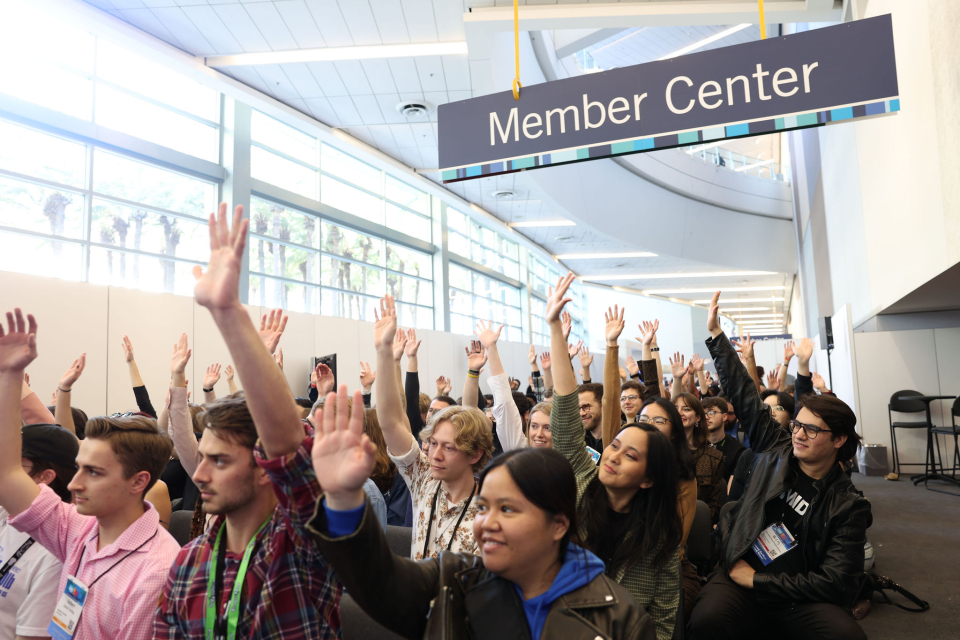9 Key Takeaways From The NAMM Show for College Students and Young Professionals
If you asked students or young professionals at The 2024 NAMM Show what their job interests are, you’d hear musician, composer, sound designer, producer and songwriter, among others. These emerging pros attended The NAMM Show to learn more about their fields of interest, network with industry experts and gain insights into the music industry.
Below is a summary of the tips for young professionals shared by speakers and panelists in two education sessions — The Lamond GenNext Student Meet & Greet, which addressed the future of music industry leadership, and “From College to Career: LACM Grads Transition to Working in the Music Industry.”
1. Put a Premium on Relationship-Building
When you build connections with people, especially with those who belong to the industry you want to develop a career in, you create a network of individuals who can share their knowledge, help you grow your skills and even lead you toward job opportunities.
Maria Timchenko, a student from Hawaiʻi Leeward Community College studying music business, says that one of the main reasons she wanted to attend The NAMM Show was to grow by developing relationships.
“The music industry seems so intimidating and so big from the outside,” Timchenko says, “but in reality, when you do make connections, people are willing to help you. I think The NAMM Show is about building those relationships and it helps you know which direction you can take.”
Relationship-building is a long-term game — create a professional online presence for yourself, including on LinkedIn, and be proactive in reaching out to others, asking questions and offering your contacts ways you can be of assistance.
2. Know Your Resources
Find and frequent the resources that will help you grow. This includes industry associations, events, websites, blogs, webinars, books, professional training and certifications. The more you read, attend and engage with those resources, the deeper your knowledge pool becomes.
3. Consider the Return You’ll Get
Your time is valuable. Think about how you spend it. What creative projects, internships, jobs, hobbies, volunteer work or events do you choose to fill your life? How is investing your time in those activities going to pay off for you once you’ve completed them? This includes thinking about the things that eat away at your time and distract from what’s important to you. Some things will give you a positive return, and others won’t — take note of those things and readjust your habits.

4. Have a Specific Goal
Feeling anxious can stem from not knowing what comes next. Having a vague sense of where you’re going is not helpful. If you write down specific goals of what you want to accomplish — then you’ve created a plan. Focus on what’s interesting to you and take micro steps to work toward it. For example, is your goal to learn more about sound mixing? Then your micro steps could be to watch a sound-mixing YouTube channel consistently, sign up for a course, join a sound-mixing LinkedIn Group, etc. Setting specific goals will help reduce the fear of uncertainty and give you something real to aim at.
5. You Can Change Your Mind About What You Want
Part of pursuing any goal is giving yourself the chance to learn whether you enjoy doing that thing or not. If you’ve learned that a particular field or job isn’t a fit for you, it’s okay to let it go. Some people make the mistake of thinking, “that was a waste of my time.” Pursuing a goal you once thought was a good idea is not a waste of time — it is useful to learn what you don’t like so that you can eliminate it and narrow in on what’s right for you. Also, your intuition will tell you if you’re giving up on something too fast or if you’ve learned enough to be able to make an informed decision that it’s time for a change.
Audrey McGill, a student who’s earning a double major in music and theater arts at Merrimack College in Massachusetts, is in the process of discovering her own career path and projects of interest.
“I have a lot of ideas for what I want to do,” McGill says. “I want to be a singer. I want to be in a band. I want to be a playwright and composer … so it’s only a matter of time before I figure it out.”
Like McGill, if you have several interests, explore them! Eventually you will discover where you want to spend most of your time.
6. Start Now — There’s No Need to Wait
Too often, students or young professionals think they need to “know more” before they begin. This way of thinking can hold you back. Just by starting, you will build momentum. For example, if you want to start your own business, start now by researching your target market, building a website, networking and completing small projects you can add to your resume. You’ll learn what you need to know just by doing it.

7. Share Your Plans With Those You Can Trust
One student attending the student meet & greet asked for advice on the best way to take chances. John Mlynczak, president and CEO of NAMM, offered this guidance: “Don’t be afraid to tell people around you, ‘hey, I’m taking a risk.’ Sometimes we don’t want to be vulnerable. So, when we’re taking a risk, we’re afraid to fail and we’re afraid to tell everyone we’re trying something new. Just be okay with sharing that so people will be there for you and support you.”
Find family members or friends you can trust and have an open conversation with them about your ideas and your plans. Those who care about you will provide feedback and encourage you along the way.
8. Don’t Compare Yourself to Others
This can be difficult when everyone’s lives are on display through social media. Remember that what you see there is a curation of the things they want to show you. The bottom line is, the more time you spend comparing yourself to others, the less time you’re spending on your own growth and progress. Every individual will face her own obstacles and successes. Your journey is unique to you, so focus on measuring where you were a year ago, where you are now, and where you want to be in the future.
9. Be Resilient
Kameron Williams, who works as a sound designer for video games and is in his final semester of graduate school at Georgia Southern University, points out some challenges many young professionals can relate to: “Everything that happened with covid, things shifted,” he says, “and with things like layoffs and AI, people are kind of scared to get into [the industry] and don’t know how to go about it.”
This gets at another point speakers offered to young professionals — in an ever-changing business environment, the ability to bounce back from hardships and adjust to change is an important quality to have. While you can’t control the change that happens, you can learn ways to adapt. Build resilience by continuing to sharpen your skills, take care of your physical and mental health, strengthen your relationships and practice a can-do mindset.
Looking to Build Your Career in the Music Industry?
As a NAMM member, you can join NAMM Young Professionals, a group that offers networking with peers and music industry veterans, access to resources and education and a mentorship program. Visit the NAMM Young Professionals page to learn more or explore resources on The NAMM Foundation's Consider a Career in Music page. Also, you can secure your spot at the next show by visiting The NAMM Show registration page.
About the Author
Jessica A. Baris is a writer on the marketing team at NAMM and editor of Playback Blog. She shares member stories, covers The NAMM Show and collaborates with industry experts to create content that educates and informs NAMM members. Baris leads a musical life as a Latin dancer, growing singer and player of instruments, including castanets, clave and tongue drum.
